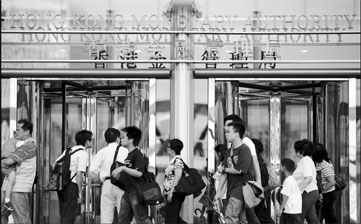|
 |
|
Pedestrians walk past Hong Kong Monetary Authority's office. Although the city's de facto central bank intervened in the foreign exchange market, a new wave of "hot money" is flooding into Hong Kong. Ted Aljibe / AFP Photo |
The Hong Kong asset market is poised to rise as a new wave of "hot money" is pouring into the local financial system after the surge in Hong Kong dollar exchange rate compelled the Hong Kong Monetary Authority?to intervene in the foreign exchange market last week.
The HKMA said it bought $603 million during New York trading hours on Oct 19 after the Hong Kong dollar moved to HK$7.75 - the strong end of its permitted trading range for the first time since December 2009 - compelling its intervention.
Credit Agricole Fixed Income Senior Strategist Frances Cheung expected the Hong Kong dollar to remain strong in the short run though the expected capital inflow scale will be less than the scale in 2009.
"Funds (will) continue to flow into Hong Kong given the monetary easing in the US and Europe," said Kenix Lai, a currency analyst at Bank of East Asia Ltd in Hong Kong. "That's evident by the rising stock market and property prices. I expect HKMA will still have to intervene in the near term as capital inflows continue."
The city's benchmark Hang Seng Index (HSI) rose 0.7 percent to 21697 on Oct 22, representing the eighth day of its cumulative rise of 3.7 percent. The index also rose 7.5 percent since the Fed's September announcement of more asset purchases, climbing 19 percent from this year's low on June 4.
"Fund inflows are betting on the possible economic bottoming-out of the mainland economy," Centaline Wealth Portfolio Manager David Leung told China Daily. "We expect the prices of those mainland-related cyclical shares such as resources, cement and bank will rebound in this new wave of liquidity-driven market."
The HKMA explained its intervention is attributed by the "capital inflows into currency and equity markets in the region due to the recent increase in demand for the local currency, weakness in the US dollar and declining US interest rates."
Besides the stock market, the local property sector will be another magnate to attract overseas fund inflows. "BOCOM maintains overweight rating on Hong Kong property sector, as property remains the preferred investment amid renewed inflation expectations after the HKMA's injection of $600 million." BOCOM International's property analyst Alfred Lau said.
However, some other analysts are rather more cautious, saying that economic fundamentals of the global economy are still fragile, but they can still uplift the local asset market for a longer period.
"We still cannot say for sure when the mainland economy is bottoming out. What we are saying is that the mainland economy may not slump further as we had witnessed in the last several quarters," Haitong International Securities Director Patrick Pun told China Daily.
"The European debt crisis is still unresolved and this financial risk may trigger capital outflow at any time," Plotio Bullion (Hong Kong) Research Director Bruce Wong told China Daily. "However, we expect capital inflows into the city will remain until the end of this year given the current economic assessment."
Policy makers from around the world have bemoaned the economic threat of stronger exchange rates following the quantitative easing policies. The Fed initiated the QE3 on Sept 13, purchasing $40 billion of mortgage-backed securities per month, and said this will continue until the outlook for jobs improves "substantially."
The European Central Bank also pledged last month to buy the governments' bonds that agree to austerity conditions while the Bank of Japan boosted its asset-purchase fund by 10 trillion yen ($126 billion) and abandoned a minimum yield for the bonds it purchases.
Bloomberg contributed to this story
